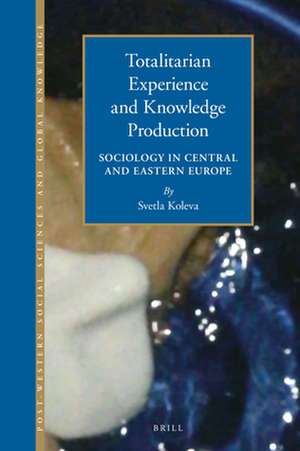Totalitarian Experience and Knowledge Production: Sociology in Central and Eastern Europe 1945-1989: Post-Western Social Sciences and Global Knowledge, cartea 2
Autor Svetla Kolevaen Limba Engleză Hardback – 30 noi 2017
Preț: 672.70 lei
Preț vechi: 820.37 lei
-18% Nou
Puncte Express: 1009
Preț estimativ în valută:
128.73€ • 133.00$ • 107.08£
128.73€ • 133.00$ • 107.08£
Carte indisponibilă temporar
Doresc să fiu notificat când acest titlu va fi disponibil:
Se trimite...
Preluare comenzi: 021 569.72.76
Specificații
ISBN-13: 9789004322325
ISBN-10: 9004322329
Pagini: 298
Dimensiuni: 155 x 235 x 23 mm
Greutate: 0.64 kg
Editura: Brill
Colecția Brill
Seria Post-Western Social Sciences and Global Knowledge
ISBN-10: 9004322329
Pagini: 298
Dimensiuni: 155 x 235 x 23 mm
Greutate: 0.64 kg
Editura: Brill
Colecția Brill
Seria Post-Western Social Sciences and Global Knowledge
Cuprins
Preface
Acknowledgments
Introduction
Part 1. Methodological Notes
1 Following the Traces of the Past: The Methodological Pitfalls of Time
2 The Object of Sociology vs. Sociology as an Object of Research: The Theoretical Pitfalls of the Conception of Totalitarianism
3 Sociology Grappling With Itself: The Conceptual Pitfalls of the Single-variant Disciplinary Self-referentiality
4 Conceptual Framework of the Analysis
Part 2. Institutional Cycles of Sociology in Central and Eastern Europe, 1945–1989
5 From Historical Chronology to Institutional Cyclicity
6 Institutional Reanimation of Sociology:–1948/49
7 Institutional Mimicry I:/49–1956
8 Institutional Expansion I:–1968
8.1 Sociology and Politics: Limits of (In)Compatibility
8.2 Toward Institutional Expansion: The General and the Specific
8.3 Paradoxes in Institutional Expansion
8.3.1 Professional Associations Without Sociologists
8.3.2 Research Structures Without Educational Structures
8.3.3 Conducting Sociological Research Without Professional Experience
8.3.4 The Self-Constructing Sociological Public: Inside and Outside the Official Space
8.4 Intermediate Recapitulation
9 Institutional Mimicry II:–1980
9.1 It All Began With Czechoslovak Sociology …
9.2 …. And then the National Sociologies of Poland and ussr Followed
9.3 Atypical Cases: Bulgarian and Hungarian Sociology
9.4 Intermediate Recapitulation
10 Institutional Expansion II:–1989
10.1 It Started With Polish Sociology
10.2 “Seedbeds of Experience” in Other National Sociologies
10.3 Official Institutional Structures, Old and New, and Their Strategies
10.4 Intermediate Recapitulation
11 Institutional Cycles: General Conclusion
part 3. Disciplinary Construction of Sociology: Processes and Modalities
12 A New Context, a New Object of Research: What Kind of Sociology?
13 From a New Deontological to a New Epistemological Model of Social Science Cognition
14 Multifaceted Sociology: Modalities of Knowledge Production
14.1 Sociological Practice Between Theory Deficit and Methodological Rigor
14.1.1 From Marxist to Post-Marxist Sociology: The Gradual Cognitive Diversification and Professionalization of Sociological Practice
14.1.2 “Empirical” Sociology: From Methodological Rigor to Theoretic Eclecticism
14.1.3 From Theoretical Escapes to Conceptual Innovations; From Loaned Methodologies to Methodological Creativity
14.2 Sociological Practice in the Continuity of Engagements-Detachments
14.2.1 From the Political Project of Socialism as a Goal and Ideal of Society, to the Empirical Reality of Socialism
14.2.2 From Studying the Empirical Reality of Socialism to Doubting the System of Socialism
15 Summing-up. Production of Scientific Knowledge about the ‘Socialist Society’: Surmounting the Paradoxes
Conclusion: “A Legacy Without a Testament”
Appendix
Bibliography
Index of Names
Index of Subjects
Acknowledgments
Introduction
Part 1. Methodological Notes
1 Following the Traces of the Past: The Methodological Pitfalls of Time
2 The Object of Sociology vs. Sociology as an Object of Research: The Theoretical Pitfalls of the Conception of Totalitarianism
3 Sociology Grappling With Itself: The Conceptual Pitfalls of the Single-variant Disciplinary Self-referentiality
4 Conceptual Framework of the Analysis
Part 2. Institutional Cycles of Sociology in Central and Eastern Europe, 1945–1989
5 From Historical Chronology to Institutional Cyclicity
6 Institutional Reanimation of Sociology:–1948/49
7 Institutional Mimicry I:/49–1956
8 Institutional Expansion I:–1968
8.1 Sociology and Politics: Limits of (In)Compatibility
8.2 Toward Institutional Expansion: The General and the Specific
8.3 Paradoxes in Institutional Expansion
8.3.1 Professional Associations Without Sociologists
8.3.2 Research Structures Without Educational Structures
8.3.3 Conducting Sociological Research Without Professional Experience
8.3.4 The Self-Constructing Sociological Public: Inside and Outside the Official Space
8.4 Intermediate Recapitulation
9 Institutional Mimicry II:–1980
9.1 It All Began With Czechoslovak Sociology …
9.2 …. And then the National Sociologies of Poland and ussr Followed
9.3 Atypical Cases: Bulgarian and Hungarian Sociology
9.4 Intermediate Recapitulation
10 Institutional Expansion II:–1989
10.1 It Started With Polish Sociology
10.2 “Seedbeds of Experience” in Other National Sociologies
10.3 Official Institutional Structures, Old and New, and Their Strategies
10.4 Intermediate Recapitulation
11 Institutional Cycles: General Conclusion
part 3. Disciplinary Construction of Sociology: Processes and Modalities
12 A New Context, a New Object of Research: What Kind of Sociology?
13 From a New Deontological to a New Epistemological Model of Social Science Cognition
14 Multifaceted Sociology: Modalities of Knowledge Production
14.1 Sociological Practice Between Theory Deficit and Methodological Rigor
14.1.1 From Marxist to Post-Marxist Sociology: The Gradual Cognitive Diversification and Professionalization of Sociological Practice
14.1.2 “Empirical” Sociology: From Methodological Rigor to Theoretic Eclecticism
14.1.3 From Theoretical Escapes to Conceptual Innovations; From Loaned Methodologies to Methodological Creativity
14.2 Sociological Practice in the Continuity of Engagements-Detachments
14.2.1 From the Political Project of Socialism as a Goal and Ideal of Society, to the Empirical Reality of Socialism
14.2.2 From Studying the Empirical Reality of Socialism to Doubting the System of Socialism
15 Summing-up. Production of Scientific Knowledge about the ‘Socialist Society’: Surmounting the Paradoxes
Conclusion: “A Legacy Without a Testament”
Appendix
Bibliography
Index of Names
Index of Subjects
Notă biografică
Svetla Koleva, DSc (2017), is Research Director at the Institute for the Study of Societies and Knowledge, Bulgarian Academy of Sciences. She has published numerous articles and six books, including Sociology as a Project. Scientific Identity and Social Challenges in Bulgaria, 1945-1989 (Pensoft, 2005, in Bulgarian), Sociology in Bulgaria through the Eyes of Generations. Interviews with Bulgarian Sociologists (Pensoft, 2012, in Bulgarian, co-editor). She edited the special issue of Sociological Problems on 'Non Hegemonic Sociologies: From Contexts to Practices' (2015) and co-edited the issue on 'New Objects of Sociology' for Cahiers de Recherche Sociologique (2016, no. 59-60).



